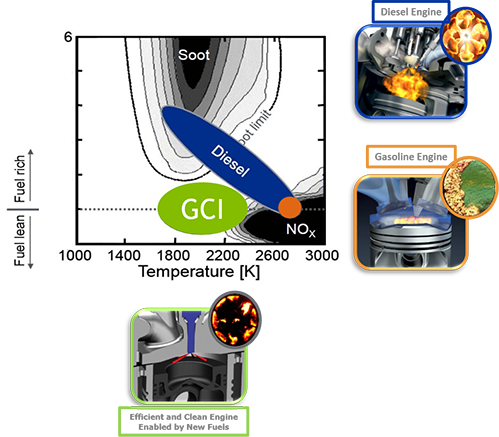CHALLENGES AND OPPORTUNITIES FACING THE TRANSPORT SECTOR
Changes in engine technology, driven by the need to increase SI engine efficiency and reduce NOx and soot from diesel engines, and by the demand for transport energy, will profoundly affect properties, specifications and production of fuels in the future. Expected increases in global demand for transport energy are significantly skewed towards heavier fuels like jet fuel and diesel, with less attention on gasoline. Knock and preignition will become more prevalent, and as spark-ignition (SI) engines develop to become more efficient, the necessity for antiknock applications will increase. Diesel engines must maintain efficiency while reducing soot and NOx emission, which can be controlled more easily when such engines run on fuels with extremely low cetane. In the long term, compression ignition engines could run on fuels that require less processing in the refinery than today's fuels. Such an engine/fuel system could be significantly cheaper and help mitigate the expected demand imbalance in favor of heavier fuels.
To realize future fuel economy and emissions targets, a deeper understanding of advanced engine technologies is needed, and these technologies should be coupled with advanced fuel formulations. One of these novel engine technologies (Fig. 1) is gasoline compression ignition (GCI), also known as low-temperature combustion (LTC), premixed charge compression ignition (PCCI), and spark-assisted compression ignition (SACI). These engine concepts have proven ability to increase energy efficiency in the automotive sector; they can achieve thermal efficiencies greater than 50%, and have low emission levels--advantages achieved by exploiting the high compression ratios of diesel engines and their mixture stratification. The result is diesel-like engine efficiency with reduced engine-out NOx and PM emissions.

Figure 1: Advanced low-temperature engines.
OBJECTIVES AND MOTIVATIONS
The objectives are to advance basic and applied knowledge of fuel combustion and to provide analysis-led combustion system development for advanced engine concepts.
The Fuel Technology (FT) team at Saudi Aramco has the vision to attain world-leadership in fuel research and technology, and to position Saudi Aramco as the key energy company shaping the direction of future mobility. This will be accomplished by promoting development and adoption of efficient and cost-effective oil-based fuel and engine systems in a socially acceptable and responsible manner, while addressing global CO2 and energy demand challenges. Our unique promotional proposition is the synergistic optimization of fuel and engine as one system.
COLLABORATION BETWEEN CCRC AND SAUDI ARAMCO'S FUEL TECHNOLOGY TEAM
The fuel combustion (FUELCOM) program is a long-term, multimillion, strategic research collaboration between the Fuel Technology Research and Development Division of Saudi Aramco and the Clean Combustion Research Center (CCRC) of King Abdullah University of Science and Technology (KAUST). The program focuses on formulating fuels to improve combustion in IC engines and reduce polluting emissions. The emphasis will be on early-stage technology development, including scientific investigation and proof of feasibility of core ideas driving Saudi Aramco's current fuel technology program. The program capitalizes on CCRC's world-class equipment, facilities and expertise to address basic research needs.